 |
 |
 |
 |
 |
 |
|
|
||||
| Contributors |
||||
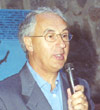 |
Professor Brincat teaches Italian linguistics and medieval
literature at the University
of Malta. He holds degrees from the universities of Malta, London
and Florence and has published five books in Italy and Malta, and over
fifty articles in various specialised journals and proceedings of conferences.
His research interests include, among others, Italian philology, the varieties
of Italian used in Malta, the Romance element in the Maltese language
and contacts between English and Italian. |
|||
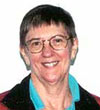 |
I am basically a teacher – whether it be in the classroom, or writing for students or teachers, running workshops for teachers and teacher trainers, or consulting in science or in English as a second language. I have had the privilege of working and writing in the UK, Ghana, the USA, Jamaica and other countries in the Caribbean, and, more recently, for part of each year in New Zealand. My first-degree work was in science, followed by a teaching diploma that convinced me that I preferred education to research. After teaching in the UK, I lived in Ghana for nine years where my three daughters were born. I also wrote my first book during this time – four degrees off the equator sitting at a student desk on weekend mornings, and in the evenings at home while being bitten by mosquitoes. I did my own drawings and wrote the labels and text, giving in camera-ready copy to a rather surprised publisher. The book Tropical Biological Drawings was reprinted, untouched, for nearly 30 years before the second edition was published by Macmillan. From Ghana, we went to the USA where I completed my PhD in Science Education and was also able to expand my interest in the teaching of language and mathematics. Our whole family 'went to school': we had homework in the evenings and helped with the washing and cleaning at the weekends. Our next country was Jamaica, where we lived for 11 years. I worked at the Ministry of Education in teacher training, curriculum development, and planning and evaluation at primary level; and in science at secondary level. Our three children continued their patchwork school lives in a variety of countries, eventually becoming PhD scientists – now working in the UK, Jamaica and Denmark. After the Caribbean, I returned to the UK and, for the past 20 years, have been self-employed with a mixture of writing and consulting work. I regularly travel to the Caribbean for workshops, and to New Zealand where my second husband was born. Writing has certain advantages: you can do your own planning and checking, and can venture into new areas and develop expertise. But is a very unstructured life and you need self-discipline and the ability to plan and stick to your own deadlines. Consulting work, on the other hand, is more structured, and draws on expertise you already possess. It also involves fitting into the plans and deadlines of others, but with the added advantage of interaction with professionals from different areas. Most of my writing has been for Caribbean and African countries, and for New Zealand, although I have written three books for UK Biology at GCSE level. I write under both of my married names, Mitchelmore and Hassall, which sometimes causes confusion! One of my most memorable books is a Primary Science revision book, Ke Pu Ke Tang, published in China as a revision of Let's Pass Science. I have also had the exciting experience of visiting China at the invitation of the Educational Research Institute in Beijing to run a week's workshop based on using process skills in primary science for 120 teacher trainers from 31 of the 32 provinces of the People's Republic of China. During my career I have written well over 100 books for over 30 countries. I began writing biology and science books for secondary level. Then I became interested in primary science and prepared full series for students and teachers in the Caribbean and in New Zealand. At workshops in the Caribbean, some teachers voiced concern over the poor reading skills of their children – which prompted me to go into primary language. I have now completed a series on teaching children to read, from basic readiness skills to full use of words, with an emphasis on phonics and a very structured 'scientist looks at language' approach. This I followed with another series for developing language mastery as a fun way to present grammar: my books present a magical 'Land of Sentences' where the words grow on trees and various characters make them into sentences, under the watchful eye of the 'Sentence Controller'. I have also extended my abiding interest in words – how they behave and how to explain what they mean. This has led me to work on my own dictionary for primary and lower secondary level for the Caribbean, and to my interest and involvement in the Macmillan School Dictionary. I am resident in the UK. But having said that, my office
is wherever I happen to be. I began this article, for example, in Fiji,
en route from New Zealand to Los Angeles on our return from a southern-hemisphere
summer. With my laptop, portable printer, various cables and adapters,
I can download files and pdfs, and deal with emails and faxes, wherever
I am. It is indeed an interesting way to live.
|
|||
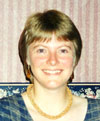 |
Kerry has a first degree in computational linguistics and an MA in theoretical linguistics from the University of Manchester, specialising in syntactic theory. For several years she worked as a researcher at Manchester and Essex universities, where in connection with European projects on machine translation, she was involved in computational lexicography, co-ordinating research in computational descriptions of compounds and collocations, and presenting her work in various international academic contexts. In 1993 she joined Cambridge University Press as a lexicographer/editor and grammar consultant, and worked on a large number of Cambridge learners’ dictionaries, including the English Pronouncing Dictionary, the Cambridge International Dictionary of Phrasal Verbs and the Cambridge Learner’s Dictionary in print and CD-ROM versions. In June 2001 Kerry moved to York where she now works as a freelance editor/lexicographer and is involved in a range of dictionary and grammar projects. |
|||
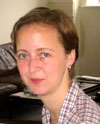 |
Diane
Nicholls
I don’t know how or when I became a lexicographer, though I think I have always been a linguist. My first degree, in Russian and French at the University of Reading led on to a postgraduate diploma in technical and specialized translation from the Polytechnic of Central London. A long spell of working as a translator, freelance and in-house, brought me to the realization that my passion for languages lay in the individual words themselves rather than in any finished documents I might produce and that translating, while a great discipline, would never allow me the time to ‘enjoy’ the words. I returned to academic study and an MLitt in Slavonic Studies at Cambridge University. There I spent my time analysing and enjoying the language and style of the short stories of Anton Chekhov and wondering how I would ever manage to make a living using my language skills. Freelance work at Cambridge University Press provided the answer and my first non-user experience of dictionaries. It was through my work on False Friends for the Cambridge International Dictionary of English that I came into contact with the Acquilex project – an international computational lexicography project on multilingual lexical databases. Two years of working as a research assistant on Acquilex provided me with an excellent apprenticeship and finally sealed my fate (in career terms). Since the end of the Acquilex project in 1995 I have worked as a freelance linguist/lexicographer and revelled in the variety and flexibility this role offers. I have worked on highly commercial software development projects as far away as Silicon Valley in California, on academic research projects closer to home and in Hong Kong and the US and on a variety of dictionary publishing projects, including learner corpora, learners’ and native-speaker dictionaries and thesauruses (CUP, Bloomsbury, OUP, Macmillan). Among other things, I seem to have found a niche in developing and executing categorization and coding systems and can usually be found wading up to my neck in words, trying to marshal them into some sort of order while secretly admiring their slipperiness. Writing articles for the MED resource site provides me with an opportunity to get a few things off my linguistic chest and express some of my admiration for the things that words can do and the problems they can cause their users. I live in Hackney, London with my husband, Rory. |
|||
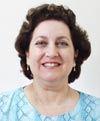 |
Rosemary Richey is a freelance Business Competency Consultant for training and material development. With a MATESL from the University of Texas, Rosemary combined her eight years of hotel management with language teaching qualification to specialize in Business English training. She worked for four years at the British Council, Damascus doing both business and teacher training in Syria and Lebanon. Rosemary has been based in Munich, Germany since 2001. Dealing with in-house company training, she specializes in Customer Care, Human Resources/ Personnel, Company Finance and Hotels/Tourism. She is authoring English for Customer Care for Cornelsen Verlag in Berlin. Rosemary is also a contributor to Macmillan’s In-Company Upper-Intermediate Teacher’s Book and onestopenglish website along with Business Spotlight magazine. You can contact Rosemary at rfhrichey@hotmail.com. |
|||
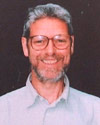 |
Michael
Vaughan-Rees Michael Vaughan-Rees started his career teaching French and German at secondary level. After switching to EFL he taught at every level, in Britain, continental Europe and North Africa. Studying his youngest daughter's bilingual development (in English and French) sparked off an interest in linguistics in general and phonetics in particular. This led, in the 80s, to his setting up the IATEFL Pronunciation SIG, which he ran for many years. His best known book is probably Rhymes and Rhythm, a poem-based course for pronunciation and listening comprehension, while his most recent publication is Test Your Pronunciation, for Penguin. But he is perhaps most proud of three books (co-written with his wife, Jane Waller) which have nothing at all to do with pronunciation, language or teaching. |
|||
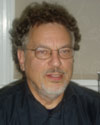 |
My teaching experience is fairly broad, and includes five years of teaching English at secondary level in Britain, as well as about twenty years in the ELT classroom, teaching from beginners to Cambridge Proficiency level at all ages, working as an examiner in IELTS and Cambridge examinations, and being involved in teacher education as a tutor for RSA courses, and in courses for state school teachers. Most of my ELT experience comes from Greece, where I taught for sixteen years, though I have also taught in Italy, and in UK language schools. For about the last fifteen years I've been writing course books and other materials, and although I still spend quite a lot of time in classrooms all over the world, it's generally as part of research into writing rather than as a teacher. The classroom is still the place where I feel most at home, though I have always been a writer of one kind or another. Though I have written a lot of grammar practice material, my main interest is still in mainstream communicative materials, and in the ways materials work, or fail to work, in the classroom. Even so, I still think that the teacher is more important than the materials, because although it's possible to teach without materials, the materials aren't much good without the teacher. I also believe that the learners bring more to the classroom than the course book does. Probably the only authentic material in the classroom is what learners have inside their heads, and I like the idea of materials which take this into account. |
|||
| Meet the Editor | ||||
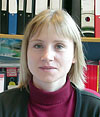 |
Kati
Sule
Kati was born in Hungary. She studied English Language and Literature at the University of Szeged in south-east Hungary and also completed an ELT degree, writing her dissertation on the role of monolingual dictionaries in ELT. She taught English as a foreign language in Hungary and briefly in the Netherlands. Kati has worked as an ELT editor since 1999. She has been involved in the Macmillan English Dictionary and Macmillan Essential Dictionary projects, and was editor of the Macmillan English Dictionary Workbook. She has also worked on the CD-ROM edition of MED and Essential, and is one of the editors of the Macmillan English Dictionaries resource site. |
|||
| Cover photograph
© Neil Barks/Alamy (language interference); Stockbyte (top tips) Cover illustration by Julian Mosedale Cover design by Mairi MacDonald |
||||
|
|
||||